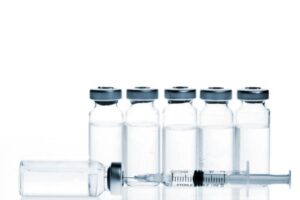
Maximising Results with GHRP-6 and Ipamorelin Peptide Stacking
Peptide stacking is a sophisticated method that involves the deliberate selection and combination of specific peptides to enhance their individual effects, leading to superior results

Autoimmune diseases affect more than 50 million Americans, with women being more susceptible than men, fuelling the need for the exploration of the link between NAD+ and autoimmunity. These diseases are widespread, difficult to diagnose, and challenging to manage, making them a major public health problem. While their molecular mechanisms are still the subject of Luxembourg research, one significant factor that could be causing their development has been identified – NAD+ depletion. NAD+ is a coenzyme involved in multiple physiological and biological processes in the body, and its depletion is associated with various age-related diseases. In this blog post, we will delve deeper into the connection between NAD+ and autoimmunity, and how Luxembourg researchers are exploring this connection to identify new treatment options.
NAD+ (nicotinamide adenine dinucleotide) is a molecule produced naturally in the human body, and its primary role is to facilitate cellular respiration. It is also involved in DNA repair, immune function, and metabolism. As we age, our bodies produce less NAD+ due to various factors. However, recent Luxembourg research has linked NAD+ depletion to several age-related diseases, including autoimmune diseases. Autoimmune diseases occur when the immune system attacks the body’s cells and tissues, mistaking them for foreign objects. Normally, the immune system recognizes and destroys foreign invaders, but in autoimmune diseases, it attacks healthy cells, resulting in tissues or organs damage.
NAD+ depletion disrupts the normal functioning of T-cells, which are immune cells that recognize and destroy foreign invaders. Data suggest that the expression of CD38, the enzyme that degrades NAD+, is higher in autoimmune disease patients than healthy individuals. This high expression leads to NAD+ depletion, resulting in the inability of T-cells to fight off the body’s foreign invaders. The depleted NAD+ also triggers the activation of B-cells, another type of immune cells that produce auto-antibodies, which attack the body’s normal cells, leading to autoimmune diseases’ development.
Luxembourg Research conducted in mouse models exploring NAD+ and autoimmunity has demonstrated that restoring NAD+ levels can combat autoimmune diseases. For instance, scientists treated mice with an NAD+ boosting molecule called NMN (nicotinamide mononucleotide), and it reversed age-associated immune dysfunction and restored immune function in the mice. Further studies are needed to investigate the efficacy of NMN on human autoimmune diseases. Nonetheless, the research highlights the potential of NAD+ boosting therapies in the management of autoimmune diseases.
In addition to NAD+ boosting therapies, researchers are also exploring the potential of NAD+ precursors, such as nicotinamide riboside (NR) and nicotinamide mononucleotide (NMN), as treatment options for autoimmune diseases. These precursors are converted into NAD+ that the body can use, in turn restoring NAD+ levels in the body. A recent small-scale study examined the effects of NR on multiple sclerosis patients. The trial observed that higher doses of NR increased NAD+ levels in participants, indicating possible therapeutic effects on the patients.
The NAD+ precursors show immense potential as treatments for autoimmune diseases. However, further Luxembourg studies are needed to determine their efficacy, safety, and optimal dosage levels. Though, encouragingly, clinical trials are ongoing, and the results could significantly impact autoimmune disease management and treatment options.
The link between NAD+ depletion and autoimmune diseases has opened new avenues for understanding and treating autoimmune diseases. Experts suggest that NAD+ precursors and NAD+ boosting therapies could be treatments for the growing population of autoimmune disease patients. The Luxembourg research highlighting the potential of NAD+ as a treatment for autoimmune diseases is still in its early stages. However, its therapeutic applications could have a significant impact on the lives of millions of people affected by autoimmune diseases worldwide, through further NAD+ and autoimmunity exploration.
Buy NAD+ from Direct SARMs Luxembourg Online Here.
[1] https://www.ncbi.nlm.nih.gov/ pmc/articles/PMC9292562/
[2] https://hms.harvard.edu/news/new-discovery-regulating-autoimmune-diseases
Disclaimer: We do not supply sarms or peptides to any individual under the age of 21. You must be a licensed and qualified healthcare practitioner. Our team of dedicated professionals are committed to providing an extensive range of products used ONLY in the process of laboratory research by responsible trained and professional individuals. All products listed on this website (direct-sarms.com) and provided through Direct Sarms are intended for laboratory research purposes only. The products listed on this website are NOT for human or animal consumption or ingestion of any kind.

Peptide stacking is a sophisticated method that involves the deliberate selection and combination of specific peptides to enhance their individual effects, leading to superior results

Maximizing Healing and Rejuvenation: Exploring the Benefits of TB500 and GHK-Cu Peptides Combined In the rapidly changing field of biomedical research, peptides have become key

Worldwideshipping

Visa/Mastercard/Zelle
Cryptocurrency /Transfers

Safe and Secure Shopping

We Distribute
From

YOU MUST BE OVER 21 YEARS IN ORDER TO USE THIS WEBSITE. All of the products are to be handled only by properly trained and qualified LABORATORY or RESEARCH professionals.